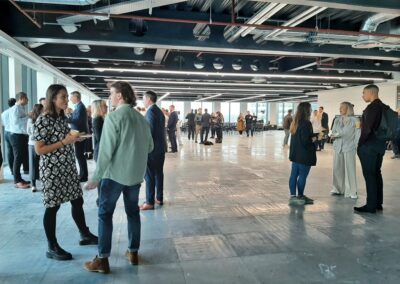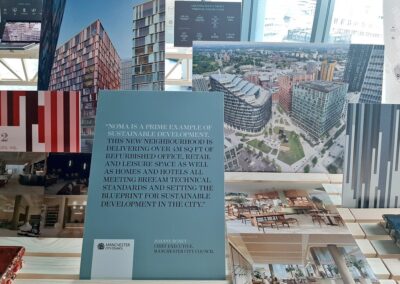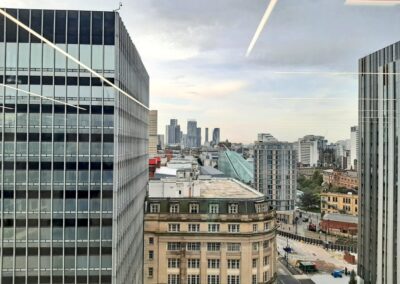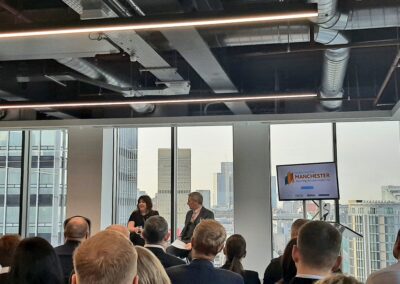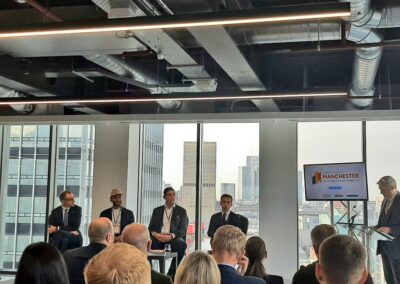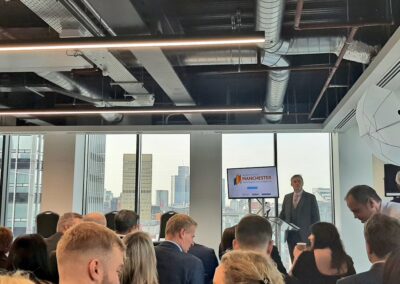Manchester was recently named the most liveable city in the UK and The Global Liveability Index ranks the city as the 28th most liveable city in the world, with London coming in 33rd.
The cities in the index are ranked according to their political stability, infrastructure, healthcare and access to green spaces. In some of these criteria, Manchester was outranked by European counterparts like Vienna, Copenhagen and Zurich.
At a breakfast event on Tuesday 10 October, Insider Media brought together decision-makers, placemakers and drivers for change across Manchester to discuss Manchester’s standing as a liveable city. Conversations covered what Manchester can learn from other global cities, and how it can become a more attractive place for people to live, work and invest. Panellists also explored how the city can adapt to be suitable for future generations, how it can retain talent and how it can take its leisure and culture offer forward.
Joining the discussions were Joanne Roney chief executive of Manchester City Council, Randel Bryan executive director of Factory International, Dan Hyde development director of MEPC, Stephen Hodder founding director of Hodder + Partners, Stuart Sayer North West strategic lead at Turner & Townsend, Marcus Dixon director of UK residential research, JLL and Professor Andy Dainty pro-vice-chancellor for education at Manchester Metropolitan University.
The panels debated at length Manchester’s growth journey and why it is an extremely liveable city, discussing a neighbourhood-led approach to development and the importance of creating new, free public spaces.
As the event was held in NOMA’s new building, 4 Angel Square, it felt apt to discuss the work MEPC have done to create a new sustainable mixed-use neighbourhood with the community at its heart. NOMA prides itself on nurturing communities, building relationships with local businesses and creating spaces the residents need. NOMA is an example of Manchester’s neighbourhood approach, creating a modern space for people to live, work, create and innovate that has people at the heart.
The panellists discussed how development partners and businesses should prioritise community spaces and the public realm when developing, one of the biggest challenges developers in high-density areas face is creating green, public spaces that work for the communities they serve.
Dan Hyde, Development Director of MEPC said “To give something longevity you need to have diversity and vibrancy. What we’re doing here at NOMA is creating something for everybody based on the green spaces and public realm we’re creating.
It’s important that these neighbourhoods have their own identity, there’s a lot of history and heritage assets around here that give a place an identity. What’s really important as Manchester evolves is connectivity, making sure those neighbourhoods are outward-looking and don’t become an island.”
Stephen Hodder founding director of Hodder + Partners said “Access to communal facilities is absolutely integral to the notion of liveability. St Michael’s will encapsulate everything about liveability. For me, what’s not being talked about in St Michael’s is the new public space we are creating in the middle, that public open space is key to liveability in the city. Wherever possible there is a responsibility to create public realm and green spaces.”
Joanne Roney, Chief Executive of Manchester City Council and Professor Andy Dainty pro-vice-chancellor for education, at Manchester Metropolitan University both called upon Manchester’s business community to support the liveability of the city, by helping to provide new opportunities and pathways for talent. Joanne Roney suggested businesses join the Greater Manchester Good Employment Charter but also support the region’s skills agenda by working with the Greater Manchester Combined Authority to influence the future of integrated and industry-led technical education across the region.
Joanne Roney said “The key to closing the inequality gap is skills and wages. We have an opportunity under the devolution deal to really think about the post-16 skills programme, we really need businesses to work with us. I’m concerned about young people in this city thinking that the city is the place for them, businesses have a role in that by working with schools, supporting t levels and providing apprenticeships.”
Speaking for the University students, Professor Andy Dainty discussed the large volume of students and international students attending Greater Manchester’s universities and the roles that businesses can play in retaining this talent in the region.
Professor Andy Dainty said “We have almost 200,000 students across the city region and that’s a really good success story, we must be doing something right. As someone who has worked at a lot of universities and studied at them, I think that this is the best student city in the UK.
“We retain about 30% of students who come to us from outside of Greater Manchester. One of the ways we can improve this is for businesses to provide work opportunities at any level. There are also all sorts of opportunities for business and the uni to work together and support the innovation ecosystem.”
Stuart Sayer North West strategic lead at Turner and Townsend discussed the need for affordable housing to retain talent and create a truly liveable city that appeals to graduates. As Manchester city-centre grows, it’s vital that young talent can afford to live within it. This also means investing in green spaces and amenities that create a place people want to live in.
Stuart Sayer said “We have a city centre from an early careers point of view which is a really good place to live. Greener spaces, education and healthcare are things we can bring in. I think we’re at a very exciting point in the journey, going from a point where we’re attractive to graduates and that demographic to becoming a truly liveable city.”
Randel Bryan, executive director of Factory International discussed how businesses within Manchester’s growing creative sector are creating more opportunities for local people, helping to retain talent and ensuring that Manchester remains a vibrant, truly exciting place to live.
Randel Bryan said “When you look at Aviva Studios, it’s that brilliant example of the need for commercial infrastructure to be underpinned by a cultural offer. We always need to appreciate that audiences will congregate around great cultural moments and Manchester building and curating these moments lifts the bar of what’s happening in the city.
“The arts are becoming more dynamic career pathways. In terms of making Manchester a more liveable city, people need to have the best years of their life here, they need to want to stay here and raise a family here. But the sector doesn’t work unless you get the talent here and out of London. The idea that you can wake up in Oldham or Moss Side and have some of the world’s leading cultural programmes being made on your doorstep is inspiring and should drive more talent into the sector.”
As Greater Manchester strives to become a greener, fairer, more prosperous city region our leaders, development partners and businesses must work to ensure the city remains liveable. This means creating places that cater to communities and provide much-needed amenities without losing sight of affordability and culture. Businesses and leaders also need to create better opportunities for residents by collaborating on skills pathways, providing access to new industries and opening up routes to work.
A truly liveable city is one in which everyone can succeed and feel like they can live a great quality of life.
As Joanne Roney said “It’s great that we’re growing but let’s not forget the attributes of the city. If we can tackle the challenges, we’ve mentioned today we can be number one. This is without doubt the best city in the world.”

